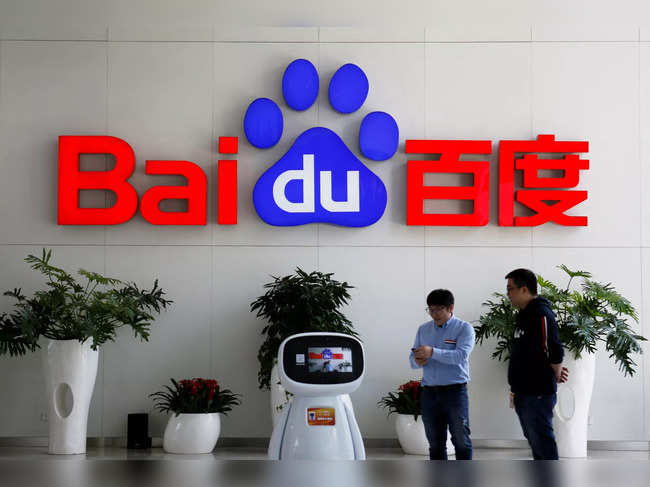 Reuters
ReutersChinese internet giant Baidu on Tuesday announced modest year-on-year revenue growth of 6% in the third quarter of 2023, beating analyst expectations.
Facing increased domestic competition and a sluggish economy, the company -- which operates a major search engine and map service -- has sought to diversify into cloud computing, autonomous driving, artificial intelligence (AI) and other sectors.
Baidu said in an earnings report on Tuesday it made a profit of $996 million in the three months through September, a year-on-year increase of 23%.
Revenue was $4.7 billion, up 6% from the equivalent period last year and beating predictions by Bloomberg analysts who had estimated a growth of 5.1%.
"Baidu reported solid third-quarter financial results, demonstrating resilience in a challenging economic climate," Baidu's CEO Robin Li said in a press release.

"Our AI-centric business and product strategy should set the stage for sustained multi-year revenue and profit expansion within our Ernie and Ernie Bot ecosystem."
Baidu has faced increased competition in recent years from domestic rivals including Tencent -- which operates the WeChat messaging platform -- and ByteDance, which owns short-video app TikTok and its mainland Chinese equivalent, Douyin.
Baidu now describes itself as "a leading AI company with strong Internet foundation".
It led Chinese tech firms in rolling out generative artificial intelligence apps, which are trained on vast amounts of data and interactions with users to answer questions, even complex ones, in human-like language.
AFP was unable to independently verify the claim in October that Ernie's "comprehension, creation, logic, and memory... are in no way inferior to those of GPT-4".
The internet is tightly controlled in China, and guidelines are already in place on the development and use of generative AI.
Content generated by this tech must "reflect core socialist values and must not contain (elements relating to) the subversion of state power", according to regulations.
These controls prevent Ernie from answering any questions on subjects considered sensitive by Chinese authorities, such as the country's leadership or its 1989 crackdown on pro-democracy protests.
Facing increased domestic competition and a sluggish economy, the company -- which operates a major search engine and map service -- has sought to diversify into cloud computing, autonomous driving, artificial intelligence (AI) and other sectors.
The company unveiled the newest version of its AI chatbot Ernie in October, claiming it rivalled the capabilities of OpenAI's ChatGPT.
Baidu said in an earnings report on Tuesday it made a profit of $996 million in the three months through September, a year-on-year increase of 23%.
Revenue was $4.7 billion, up 6% from the equivalent period last year and beating predictions by Bloomberg analysts who had estimated a growth of 5.1%.
"Baidu reported solid third-quarter financial results, demonstrating resilience in a challenging economic climate," Baidu's CEO Robin Li said in a press release.
Discover the stories of your interest

"Our AI-centric business and product strategy should set the stage for sustained multi-year revenue and profit expansion within our Ernie and Ernie Bot ecosystem."
Baidu has faced increased competition in recent years from domestic rivals including Tencent -- which operates the WeChat messaging platform -- and ByteDance, which owns short-video app TikTok and its mainland Chinese equivalent, Douyin.
Baidu now describes itself as "a leading AI company with strong Internet foundation".
It led Chinese tech firms in rolling out generative artificial intelligence apps, which are trained on vast amounts of data and interactions with users to answer questions, even complex ones, in human-like language.
AFP was unable to independently verify the claim in October that Ernie's "comprehension, creation, logic, and memory... are in no way inferior to those of GPT-4".
The internet is tightly controlled in China, and guidelines are already in place on the development and use of generative AI.
Content generated by this tech must "reflect core socialist values and must not contain (elements relating to) the subversion of state power", according to regulations.
These controls prevent Ernie from answering any questions on subjects considered sensitive by Chinese authorities, such as the country's leadership or its 1989 crackdown on pro-democracy protests.












